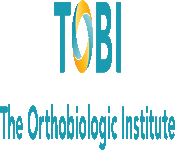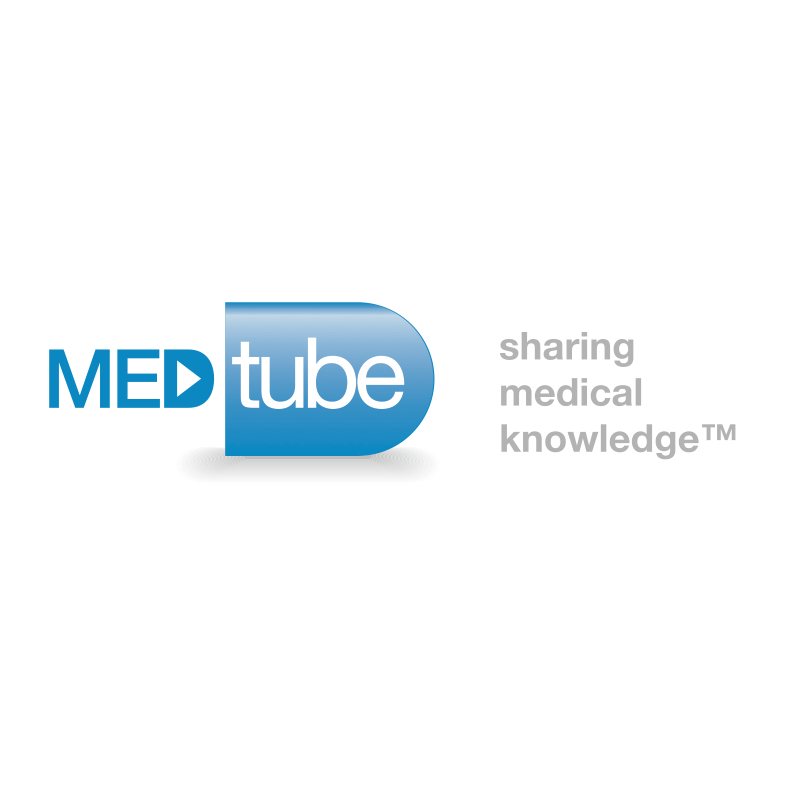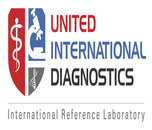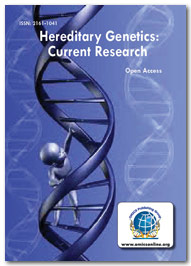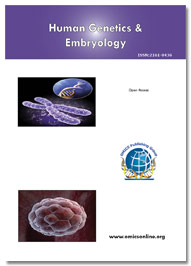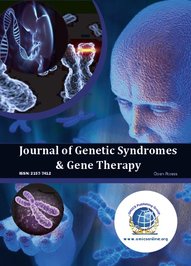Theme: Genomic Revolution: A debate on Human Genetic Disorders & Diseases
Human Genetics 2016
Track 1: Human Genetics
Human genetics is the study of inheritance as it occurs in human beings. Human genetics encompasses a variety of overlapping fields including: classical genetics, cytogenetic, molecular genetics, biochemical genetics, genomics, population genetics, developmental genetics, clinical genetics, and genetic counselling.
Genes can be the common factor of the qualities of most human-inherited traits. Study of human genetics can be useful as it can answer questions about human nature, understand the diseases and development of effective disease treatment, and understand genetics of human life. This article describes only basic features of human genetics.
Related Genetics Conferences | Human Genetics Conferences | ConferenceSeries Ltd
Conference on Molecular Genetics, 28-30 November 2016 (Chicago, USA); Conference on Genomics and Pharmacogenomics, 22-24 September 2016 (Berlin, Germany); World Congress on Human Genetics, 31October – 02November 2016 (Valencia, Spain); Conference on Genetic Counselling and Genomic Medicine, 11-12 August, 2016 (Birmingham, UK); Cell and Gene Therapy Congress, 19-21 May 2016 ( San Antonio, USA); The 44nd Biennial American Cytogenetics Conference,16-18 May, 2016 (Oregon, USA); The European Human Genetics Conference 2016, 21-24 May, 2016 (Barcelona, Spain); Game of Epigenetics Conference, 24 - 26 April 2016 (Dubrovnik, Croatia)
Track 2: Cellular and Molecular Genetics
The study of genetics at the level of the basic building blocks of cells and at the DNA level. Cells are as complex as they are tiny and much is still unknown about the inner workings of these building blocks of life. If you'd like to log hours in a lab and use advanced equipment to help advance the understanding of how cells work, studies in cellular and molecular biology could be for you. Biology is the study of living things, and cellular or molecular biology studies living things on the smallest possible scale. To prepare for a career in cellular or molecular biology, individuals must have a strong understanding of chemistry, statistics and physics. The research of cellular and molecular biologists is integral to things like the development of new medications, the protection of aquatic ecosystems and the improvement of agricultural products. A student pursuing an undergraduate or graduate degree in cellular and molecular Genetics spends time divided between classroom lectures and practical laboratory instruction. Research is an important part of this field, and students must be comfortable using highly advanced pieces of equipment to conduct experiments. In addition, cellular and molecular biology programs teach students about cellular structures and their functions, how cells make and use things like proteins and enzymes and much more. Courses covered in a molecular or cellular biology degree program may include microbiology, epidemiology, microscopy and molecular genetics. The following Study.com articles offer more details about this field of study.
Related Genetics Conferences | Human Genetics Conferences | ConferenceSeries Ltd
Conference on Molecular Genetics, 28-30 November 2016 (Chicago, USA); Conference on Genomics and Pharmacogenomics, 22-24 September 2016 (Berlin, Germany); World Congress on Human Genetics, 31October – 02November 2016 (Valencia, Spain); Cell and Gene Therapy Congress, 19-21 May 2016 ( San Antonio, USA); The 44nd Biennial American Cytogenetics Conference,16-18 May, 2016 (Oregon, USA); The European Human Genetics Conference 2016, 21-24 May, 2016 (Barcelona, Spain); Game of Epigenetics Conference, 24 - 26 April 2016 (Dubrovnik, Croatia)
Track 3:Clinical Genetics
Clinical Genetics is the medical specialty which provides a diagnostic service and "genetic counselling" for individuals or families with, or at risk of, conditions which may have a genetic basis. Genetic disorders can affect any body system and any age group. The aim of Genetic Services is to help those affected by, or at risk of, a genetic disorder to live and reproduce as normally as possible. In addition a large number of individuals with birth defects and/or learning disabilities are referred and investigated for genetic factors. Individuals identified through childhood or pregnancy screening programmes also require genetic services. In the future, as the genetic contributions to common later-onset disorders such as diabetes and coronary heart disease are identified, genetic services may be required for those at high risk. Testing for genetic factors that affect drug prescribing will also increasingly become an important activity.
Related Genetics Conferences | Human Genetics Conferences | ConferenceSeries Ltd
Conference on Molecular Genetics, 28-30 November 2016 (Chicago, USA); Conference on Genomics and Pharmacogenomics, 22-24 September 2016 (Berlin, Germany); World Congress on Human Genetics, 31October – 02November 2016 (Valencia, Spain); Cell and Gene Therapy Congress, 19-21 May 2016 ( San Antonio, USA); The 44nd Biennial American Cytogenetics Conference,16-18 May, 2016 (Oregon, USA); The European Human Genetics Conference 2016, 21-24 May, 2016 (Barcelona, Spain); workshop on Cancer Genetic and Cytogenetic Diagnostics, 6-8 April, 2016, (Nijmegen, Netherlands); Game of Epigenetics Conference, 24 - 26 April 2016 (Dubrovnik, Croatia)
Track 4: Genomics: Disease and Evolution
Genomics is a discipline in genetics that applies recombinant DNA, DNA sequencing methods, and bioinformatics to sequence, assemble, and analyze the function and structure of genomes (the complete set of DNA within a single cell of an organism).Advances in genomics have triggered a revolution in discovery-based research to understand even the most complex biological systems such as the brain. The field includes efforts to determine the entire DNA sequence of organisms and fine-scale genetic mapping. The field also includes studies of intragenomic phenomena such as heterosis, epistasis, pleiotropy and other interactions between loci and alleles within the genome. In contrast, the investigation of the roles and functions of single genes is a primary focus of molecular biology or genetics and is a common topic of modern medical and biological research. Research of single genes does not fall into the definition of genomics unless the aim of this genetic, pathway, and functional information analysis is to elucidate its effect on, place in, and response to the entire genome's networks.
Related Genetics Conferences | Human Genetics Conferences | ConferenceSeries Ltd
International Conference on Clinical and Molecular Genetics, November 28-30, 2016 Chicago, USA; 2nd International Conference on Transcriptomics August 18-20, 2016 Portland, Oregon USA; International Conference on Next Generation Sequencing July 21-22, 2016 Berlin, Germany; The Fourteenth Asia PacificBioinformatics Conference, 11th-13 January 2016, San Francisco, USA; World Congress on Human GeneticsOctober 31- November 02, 2016 Valencia, Spain; 18th International Conference on Genetics and Genomics, June 9 - 10, 2016, San Francisco, USA; NGS ’16 Genome Annotation, April 4 – 6, 2016, Barcelona, Spain;Maintenance of Genome Stability 2016, March 7-10, 2016, Panama, Central America; Epigenomics: new marks, new horizons, December 2015, 2 December 2015, UK; Human Genome Meeting, 28 February – 2 March 2016, Houston, USA
Track 5: Cancer Genetics:
Cancer is a genetic disorder in which the normal control of cell growth is lost. Cancer genetics is now one of the fastest expanding medical specialties. At the molecular level, cancer is caused by mutation(s) in DNA, which result in aberrant cell proliferation. Most of these mutations are acquired and occur in somatic cells. However, some people inherit mutation(s) in the germ line. The mutation(s) occur in two classes of cellular genes: oncogenes and tumor suppressor genes. Under normal conditions, tumor suppressor genesregulate cellular differentiation and suppression of proliferation. Mutations in these genes result in unchecked cellular proliferation resulting in tumors with abnormal cell cycles and tumor proliferation. The tumor suppressor genes contribute to cancer by the inactivating of loss of function mutation.
Related Genetics Conferences | Human Genetics Conferences | ConferenceSeries Ltd
Conference on Cervical Cancer, 22-23 September, 2016 (Vienna, Austria); 6th World Congress on Cancer Therapy, 01-03 December, 2016 (Baltimore, USA); 13th Global Summit on Cancer Therapy 17-19 October, 2016 (Dubai, UAE); Conference on Pancreatic and Colorectal Cancer, 29-30 March, 2016 (Atlanta, USA); Global Summit on Melanoma , 14-15 July, 2016 (Brisbane, Australia); Advances in Ovarian Cancer Research: Exploiting Vulnerabilities (Orlando, Florida); Advance in Breast Cancer Research ( Washington, DC); Advances in Pediatric Cancer Research (Florida); New Horizons in Cancer Research Conference (Sanghai, China).
Track 6: Stem cells and Regenerative Medicine
Many of the stem cells being studied are referred to as pluripotent, meaning they can give rise to any of the cell types in the body but they cannot give rise on their own to an entirely new body. (Only the earliest embryonic cells, which occur just after fertilization, can give rise to a whole other organism by themselves.) Other stem cells, such as the ones found in the adult body, are multipotent, meaning they can develop into a limited number of different tissue types. One of the most common stem cell treatments being studied is a procedure that extracts a few stem cells from a person's body and grows them in large quantities in the laboratory—what scientists refer to as expanding the number of stem cells. Once a sufficient number have been produced in this manner, the investigators inject them back into the patient. You could say that medicine up until now has been all about replacements. If your heart valve isn't working, you replace it with another valve, say from a pig. With regenerative medicine, you're treating the cause and using your own cells to perform the replacement. The hope is that by regenerating the tissue, you're causing the repairs to grow so that it's like normal.
Genetic disorders may or may not be heritable, i.e., passed down from the parents' genes. In non-heritable genetic disorders, defects may be caused by new mutations or changes to the DNA
Related Genetics Conferences | Human Genetics Conferences | ConferenceSeries Ltd
International Conference on Pancreatic and Colorectal Cancer, March 29-30, 2016, Atlanta, USA; International Conference on Prostate Cancer and Treatment, May 5-7, 2016, Chicago, USA; Cancer Diagnostics Conference and Expo June 13-15, 2016, Rome, Italy; International Conference on Tissue Engineering andRegenerative Medicine, Sept 12-14, 2016, Berlin Germany; Gene Regulatory Networks and the Encoded Causality of Development, May 16-18, 2016, California, USA; Stem Cell Models of Neural Degeneration and Disease, February 1-3, 2016 Dresden, Germany; Stem Cells and Cancer, March 6-10, 2016, Colorado, USA; Transdifferentiation and Tissue Plasticity in Cardiovascular Rejuvenation; February 7-10, 2016, West Sussex, UK
Track 7: Cancer and Genome Integrity
The research program in the Genome Integrity is focused on the exploration of the causes and effects of genomic instability, mechanisms of DNA repair and the study of DNA repair breakdown as an initiating or protective event in aging and cancers. The program will emphasize a mechanistic understanding of the pathways that maintain genomic integrity, the intersection of these pathways with normal cellular physiology and cancer and the application of these insights to the development of new therapeutic strategies. The Genome integrity has made major contributions towards a detailed understanding of DNA repair pathway selection as a primary influence on genomic stability and drug resistance/sensitivity in breast and ovarian cancers and the influential role of DNA repair proteins in the promotion of specific hematological malignancies
Related Genetics Conferences | Human Genetics Conferences | ConferenceSeries Ltd
International Conference on Cervical Cancer, 22-23 September, 2016 (Vienna, Austria); 6th World Congress onCancer Therapy, 01-03 December, 2016 (Baltimore, USA); 13th Global Summit on Cancer Therapy 17-19 October, 2016 (Dubai, UAE); International Conference on Pancreatic and Colorectal Cancer, 29-30 March, 2016 (Atlanta, USA); Global Summit on Melanoma And Carcinoma, 14-15 July, 2016 (Brisbane, Australia); Chromatin and Epigenetic in Cancer ( Atlanta, Georgia); Advances in Ovarian Cancer Research: Exploiting Vulnerabilities (Orlando, Florida); Advance in Breast Cancer Research ( Washington, DC); Advances in Pediatric Cancer Research (Florida); New Horizons in Cancer Research Conference (Sanghai, China).
Track 8: Diabetes and Obesity
The UK is officially the 'fattest' country in Europe, with approximately 1 in 5 adults overweight and one in every 15 obese. Over the next 20 years, the number of obese adults in the country is forecast to soar by a staggering 73% to 26 million people. According to health experts, such a rise would result in more than a million extra cases of type 2 diabetes, heart disease and cancer. Obesity is also no longer a condition that just affects older people, although the likelihood does increase with age, and increasing numbers of young people have been diagnosedwith obesity. While the exact causes of diabetes are still not fully understood, it is known that factors up the risk of developing different types of diabetes mellitus. For type 2 diabetes, this includes being overweight or obese (having a body mass index - BMI - of 30 or greater).In fact, obesity is believed to account for 80-85% of the risk of developing type 2 diabetes, while recent research suggests that obese people are up to 80 times more likely to develop type 2 diabetes than those with a BMI of less than 22.
Related Genetics Conferences | Human Genetics Conferences | ConferenceSeries Ltd
Diabetes Conferences Europe September 15-17, 2016, Germany;6th Global Diabetes Summit and Medicare Expo, November 02-04, 2015, UAE; International Conference on Thyroid Disorders and Treatment, February 29-March 02, 2016, USA; 11th Asia Pacific Diabetes Conference and Expo, July 11-13, 2016, Australia; 9th Global Diabetologists Annual Meeting and Medicare Expo, June 06-08, 2016, USA; 11th International Conference and Exhibition on Targeting Diabetes and Novel Therapeutics, October 17-19, 2016, Malaysia; Advanced Technologies & Treatments for Diabetes conference, Milan, Italy; New Therapeutics for Diabetes and Obesity conference, La Jolla, United States; Primary Care Update: Type 2 Diabetes, Metabolic Syndrome and Obesity Baltic Cruise conference, Copenhagen, Denmark; International Conference on Diabetes and Nutritionconference, Toronto Canada; Diabetes: New Insights into Molecular Mechanisms and Therapeutic Strategies conferences, Japan;Endocrinology Conferences October 10-12, 2016 Manchester, UK; Obesity Medicine Conferences Nov 14-15, 2016 Dubai, UAE
Track 9: Congenital disorders
Congenital disorder, also known as congenital disease, birth defect or anomaly is a condition existing at or before birth regardless of cause. Of these diseases, those characterized by structural deformities are termed "congenital anomalies" and involve defects in a developing fetus. Birth defects vary widely in cause and symptoms. Any substance that causes birth defects is known as a teratogen. Some disorders can be detected before birth through prenatal diagnosis (screening). Birth defects are present in about 3% of newborns in USA. Congenital anomalies resulted in about 632,000 deaths per year in 2013 down from 751,000 in 1990. The type with the greatest numbers of deaths are congenital heart disease (323,000), followed by neural tube defects (69,000).
Related Genetics Conferences | Human Genetics Conferences | ConferenceSeries Ltd
International Conference on Neuro Genetics June 6-7, 2016 London, UK; 5th World Congress on Neurology and Therapeutics March 14-16, 2016 London, UK; 2nd International Conference on Neurological Disorders and Stroke, April 28-30, 2016 Dubai, UAE; 6th World Neurological Conference May 19-21, 2016 San Antonio, USA; 6th Annual Traumatic Brain Injury Conference May 11-12, 2016 Washington, USA; 10th FENS Forum of Neuroscience July 2-6, 2016 Copenhagen, Denmark; 10th World Congress on Controversies in NeurologyMarch 17-20, 2016 Lisbon, Portugal; 9th World Congress for Neurorehabilitation May 10-13, 2016 Philadelphia, USA; 4th Annual International Conference on Neuroscience and Neurobiology Research October 26-27, 2015Bangkok, Thailand
Track 10: Cytogenetics
Cytogenetic is a branch of genetics that is concerned with the study of the structure and function of the cell, especially the chromosomes. It includes routine analysis of G-banded chromosomes, other cytogenetic banding techniques, as well as molecular cytogenetics such as fluorescent in situ hybridization (FISH) and comparative genomic hybridization (CGH). Chromosomes were first observed in plant cells by Karl Wilhelm von Nägeli in 1842. Their behavior in animal (salamander) cells was described by Walther Flemming, the discoverer of mitosis, in 1882. The name was coined by another German anatomist, von Waldeyer in 1888.
The next stage took place after the development of genetics in the early 20th century, when it was appreciated that the set of chromosomes (the karyotype) was the carrier of the genes. Levitsky seems to have been the first to define the karyotype as the phenotypic appearance of the somatic chromosomes, in contrast to their genic contents. Investigation into the human karyotype took many years to settle the most basic question: how many chromosomes does a normal diploid human cell contain? In 1912, Hans von Winiwarter reported 47 chromosomes in spermatogonia and 48 in oogonia, concluding an XX/XO sex determination mechanism. Painter in 1922 was not certain whether the diploid number of man was 46 or 48, at first favoring 46. He revised his opinion later from 46 to 48, and he correctly insisted on man having an XX/XY system. Considering their techniques, these results were quite remarkable.
Related Genetics Conferences | Human Genetics Conferences | ConferenceSeries Ltd
Conference on Molecular Genetics, 28-30 November 2016 (Chicago, USA); Conference on Genomics and Pharmacogenomics, 22-24 September 2016 (Berlin, Germany); World Congress on Human Genetics, 31October – 02November 2016 (Valencia, Spain); Cell and Gene Therapy Congress, 19-21 May 2016 ( San Antonio, USA); The 44nd Biennial American Cytogenetics Conference,16-18 May, 2016 (Oregon, USA); The European Human Genetics Conference 2016, 21-24 May, 2016 (Barcelona, Spain); Game of Epigenetics Conference, 24 - 26 April 2016 (Dubrovnik, Croatia); Game of Epigenomics Conference, 24 - 26 April 2016 (Dubrovnik, Croatia); The 44nd Biennial American Cytogenetic Conference,16-18 May, 2016 (Oregon, USA); The European Human Genetics Conference 2016, 21-24 May, 2016 (Barcelona, Spain); 4th International workshop on Cancer Genetics and Cytogenetic Diagnostics, 6-8 April, 2016, (Nijmegen, Netherlands); Chromatin and Epigenetics, 20-24 Mar 2016 (Whistler, Canada)
Track 11: Transplantation
Transplantation is the transfer (engraftment) of human cells, tissues or organs from a donor to a recipient with the aim of restoring function(s) in the body. When transplantation is performed between different species, e.g. animal to human, it is named xenotransplantation. Development of the field of organ and tissue transplantation has accelerated remarkably since the human major histocompatibility complex (MHC) was discovered in 1967. Matching of donor and recipient for MHC antigens has been shown to have a significant positive effect on graft acceptance. The roles of the different components of the immune system involved in the tolerance or rejection of grafts and in graft-versus-host disease have been clarified. These components include: antibodies, antigen presenting cells, helper and cytotoxic T cell subsets, immune cell surface molecules, signaling mechanisms and cytokines that they release. The development of pharmacologic and biological agents that interfere with the alloimmune response and graft rejection has had a crucial role in the success of organ transplantation Combinations of these agents work synergistically, leading to lower doses of immunosuppressive drugs and reduced toxicity. Reports of significant numbers of successful solid organ transplants include those of the kidneys, liver, heart and lung. The use of bone marrow transplantation for hematological diseases, particularly hematological malignancies and primary immunodeficiency’s, has become the treatment of choice in many of these conditions
Related Genetics Conferences | Human Genetics Conferences | ConferenceSeries Ltd
Conference on Molecular Genetics, 28-30 November 2016 (Chicago, USA); Conference on Genomics and Pharmacogenomics, 22-24 September 2016 (Berlin, Germany); World Congress on Human Genetics, 31October – 02November 2016 (Valencia, Spain); Conference on Genetic Counselling and Genomic Medicine, 11-12 August, 2016 (Birmingham, UK); Cell and Gene Therapy Congress, 19-21 May 2016 ( San Antonio, USA); The 44nd Biennial American Cytogenetics Conference,16-18 May, 2016 (Oregon, USA); The European Human Genetics Conference 2016, 21-24 May, 2016 (Barcelona, Spain); Cancer Genetic and Cytogenetic Diagnostics, 6-8 April, 2016, (Nijmegen, Netherlands); Chromatin and Epigenetics, 20-24 Mar 2016 (Whistler, Canada); Game of Epigenetics Conference, 24 - 26 April 2016 (Dubrovnik, Croatia); Game of Epigenomics Conference, 24 - 26 April 2016 (Dubrovnik, Croatia); American Cytogenetic Conference,16-18 May, 2016 (Oregon, USA); The European Human Genetics Conference 2016, 21-24 May, 2016 (Barcelona, Spain); 4th International workshop on Cancer Genetics and Cytogenetic Diagnostics, 6-8 April, 2016, (Nijmegen, Netherlands); Chromatin and Epigenetics, 20-24 Mar 2016 (Whistler, Canada)
Track 12: Neurodevelopmental disorders
Neurodevelopmental disorders are impairments of the growth and development of the brain or central nervous system. A narrower use of the term refers to a disorder of brain function that affects emotion, learning ability, self-control and memory and that unfolds as the individual grows. The term is sometimes erroneously used as an exclusive synonym for autism and autism spectrum disorders. The development of the brain is orchestrated, tightly regulated, and genetically encoded process with clear influence from the environment. This suggests that any deviation from this program early in life can result in neurodevelopmental disorders and, depending on specific timing, might lead to distinct pathology later in life. Because of that, there are many causes of neurodevelopmental disorder, which can range from deprivation, genetic and metabolic diseases, immune disorders, infectious diseases, nutritional factors, physical trauma, and toxic and environmental factors. Some neurodevelopmental disorders—such as autism and other pervasive developmental disorders—are considered multifactorial syndromes (with many causes but more specific neurodevelopmental manifestation).
Related Genetics Conferences | Human Genetics Conferences | ConferenceSeries Ltd
Conference on Molecular Genetics, 28-30 November 2016 (Chicago, USA); Conference on Genomics and Pharmacogenomics, 22-24 September 2016 (Berlin, Germany); World Congress on Human Genetics, 31October – 02November 2016 (Valencia, Spain); Conference on Genetic Counselling and Genomic Medicine, 11-12 August, 2016 (Birmingham, UK); Cell and Gene Therapy Congress, 19-21 May 2016 ( San Antonio, USA); The 44nd Biennial American Cytogenetics Conference,16-18 May, 2016 (Oregon, USA); The European Human Genetics Conference 2016, 21-24 May, 2016 (Barcelona, Spain); 4th Cancer Genetic and Cytogenetic Diagnostics, 6-8 April, 2016, (Nijmegen, Netherlands); Chromatin and Epigenetics, 20-24 Mar 2016 (Whistler, Canada); Game of Epigenetics Conference, 24 - 26 April 2016 (Dubrovnik, Croatia); Game of Epigenomics Conference, 24 - 26 April 2016 (Dubrovnik, Croatia); The 44nd Biennial American Cytogenetic Conference,16-18 May, 2016 (Oregon, USA); The European Human Genetics Conference 2016, 21-24 May, 2016 (Barcelona, Spain); 4th International workshop on Cancer Genetics and Cytogenetic Diagnostics, 6-8 April, 2016, (Nijmegen, Netherlands); Chromatin and Epigenetics, 20-24 Mar 2016 (Whistler, Canada)
Track 13: Pharmacogenetics
Pharmacogenetics is the study of inherited genetic differences in drug metabolic pathways which can affect individual responses to drugs, both in terms of therapeutic effect as well as adverse effects.The term Pharmacogenetics is often used interchangeably with the term pharmacogenomics which also investigates the role of acquired and inherited genetic differences in relation to drug response and drug behavior through a systematic examination of genes, gene products, and inter- and intra-individual variation in gene expression and function. In oncology, pharmacogenetics historically is the study of germ line mutations (e.g., single-nucleotidepolymorphisms affecting genes coding for liver enzymes responsible for drug deposition and pharmacokinetics), whereas pharmacogenomics refers to somatic mutations in tumoral DNA leading to alteration in drug response (e.g., KRAS mutations in patients treated with anti-Her1 biologics).
Related Genetics Conferences | Human Genetics Conferences | ConferenceSeries Ltd
Conference and Exhibition on Metabolomics, May 16-18, 2016 Osaka, Conference on Genetic Counseling and Genomic Medicine August 11-12, 2016 Birmingham; Japan; 5th Conference on Tissue Science and Regenerative Medicine September 12-14, 2016 Berlin, Germany; Conference on Restorative Medicine October 24-26, 2016 Chicago, USA; Conference on Clinical and Molecular Genetics, November 28-30, 2016 Chicago, USA; Golden Helix Symposium, January 14-16, 2016, Mansoura, Egypt; The Personalized Medicine, World Conference 24-27 January, 2016, San Francisco, USA; 14th Asia-Pacific Federation for Clinical Biochemistry and Laboratory Medicine Congress, November 26-29, 2016,Taipei, Taiwan; Personalized Medicine, July 10-15, 2016, Hong Kong, China; Conference on Pharmaceutical Engineering and Pharmacogenetics, March 30 - 31, 2016, Istanbul, Turkey
Track 14: Pharmacogenomics
Pharmacogenomics is the study of how genes affect a person’s response to drugs. This relatively new field combines pharmacology (the science of drugs) and genomics (the study of genes and their functions) to develop effective, safe medications and doses that will be tailored to a person’s genetic makeup. Many drugs that are currently available are “one size fits all,” but they don’t work the same way for everyone. It can be difficult to predict who will benefit from a medication, who will not respond at all, and who will experience negative side effects (called adverse drug reactions). Adverse drug reactions are a significant cause of hospitalizations and deaths in the United States. With the knowledge gained from the Human Genome Project, researchers are learning how inherited differences in genes affect the body’s response to medications. These genetic differences will be used to predict whether a medication will be effective for a particular person and to help prevent adverse drug reactions.The field of pharmacogenomics is still in its infancy. Its use is currently quite limited, but new approaches are under study in clinical trials. In the future, pharmacogenomics will allow the development of tailored drugs to treat a wide range of health problems, including cardiovascular disease, Alzheimer disease, cancer, HIV/AIDS, and asthma.
Related Genetics Conferences | Human Genetics Conferences | ConferenceSeries Ltd
Conference and Exhibition on Metabolomics, May 16-18, 2016 Osaka, Conference on Genetic Counseling and Genomic Medicine August 11-12, 2016 Birmingham; Japan; 5th Conference on Tissue Science and Regenerative Medicine September 12-14, 2016 Berlin, Germany; Conference on Restorative Medicine October 24-26, 2016 Chicago, USA; Conference on Molecular Genetics, November 28-30, 2016 Chicago, USA; Golden Helix Symposium, January 14-16, 2016, Mansoura, Egypt; The Personalized Medicine, World Conference 24-27 January, 2016, San Francisco, USA; 14th Asia-Pacific Federation for Clinical Biochemistry and Laboratory Medicine Congress, November 26-29, 2016,Taipei, Taiwan; Personalized Medicine, July 10-15, 2016, Hong Kong, China; 18th International Conference on Pharmaceutical Engineering , March 30 - 31, 2016, Istanbul, Turkey
Track 15: Drug discovery
Driven by chemistry but increasingly guided by pharmacology and the clinical sciences, drug research has contributed more to the progress of medicine during the past century than any other scientific factor. Improving the science of drug development and regulation is important in fulfilling the public health. The advent of molecular biology and, in particular, of genomic sciences is having a deep impact on drug discovery. Emphasis is placed on the contrast between the academic and industrial research operating environments, which can influence the effectiveness of research collaboration between the two constituencies, but which plays such an important role in drug innovation. The strategic challenges that research directors face are also emphasized.
Related Genetics Conferences | Human Genetics Conferences | ConferenceSeries Ltd
Conference and Exhibition on Metabolomics, May 16-18, 2016 Osaka,; Conference on Genetic Counseling and Genomic Medicine August 11-12, 2016 Birmingham; Japan; 5th Conference on Tissue Science and Regenerative Medicine September 12-14, 2016 Berlin, Germany; Conference on Restorative Medicine October 24-26, 2016 Chicago, USA; Conference on Molecular Genetics, November 28-30, 2016 Chicago, USA; Golden Helix Symposium, January 14-16, 2016, Mansoura, Egypt; The Personalized Medicine, World Conference 24-27 January, 2016, San Francisco, USA; 14th Asia-Pacific Federation for Clinical Biochemistry and Laboratory Medicine Congress, November 26-29, 2016,Taipei, Taiwan; Personalized Medicine, July 10-15, 2016, Hong Kong, China; 18th International Conference on Pharmaceutical Engineering , March 30 - 31, 2016, Istanbul, Turkey
Track 16: Bioinformatics in Human Genetics
Recent developments, including next-generation sequencing (NGS), bio-ontologies and the Semantic Web, and the growing role of hospital information technology (IT) systems and electronic health records, amass ever-increasing amounts of data before human genetics scientists and clinicians. However, they have ever-improving tools to analyze those data for research and clinical care. Correspondingly, the field of bioinformatics is turning to research questions in the field of human genetics, and the field of human genetics is making greater use of bioinformatic algorithms and tools. The choice of "Bioinformatics and Human Genetics" as the topic of this special issue of Human Mutation reflects this new importance of bioinformatics and medical informatics in human genetics. Experts from among the attendees of the Paris 2010 Human Variome Project symposium provide a survey of some of the "hot" computational topics over the next decade. These experts identify the promise-what human geneticists who are not themselves bioinformaticians stand to gain-as well as the challenges and unmet needs that are likely to represent fruitful areas of research.
Related Genetics Conferences | Human Genetics Conferences | ConferenceSeries Ltd
Conference on Molecular Genetics, 28-30 November 2016 (Chicago, USA); Conference on Genomics and Pharmacogenomics, 22-24 September 2016 (Berlin, Germany); World Congress on Human Genetics, 31October – 02November 2016 (Valencia, Spain);Conference on Genetic Counselling and Genomic Medicine, 11-12 August, 2016 (Birmingham, UK); Cell and Gene Therapy Congress, 19-21 May 2016 ( San Antonio, USA); The 44nd Biennial American Cytogenetics Conference,16-18 May, 2016 (Oregon, USA); The European Human Genetics Conference 2016, 21-24 May, 2016 (Barcelona, Spain); Cancer Genetic and Cytogenetic Diagnostics, 6-8 April, 2016, (Nijmegen, Netherlands); Chromatin and Epigenetics, 20-24 Mar 2016 (Whistler, Canada); Game of Epigenetics Conference, 24 - 26 April 2016 (Dubrovnik, Croatia); Game of Epigenomics Conference, 24 - 26 April 2016 (Dubrovnik, Croatia); The 44nd Biennial American Cytogenetic Conference,16-18 May, 2016 (Oregon, USA); The European Human Genetics Conference 2016, 21-24 May, 2016 (Barcelona, Spain); 4th International workshop on Cancer Genetics and Cytogenetic Diagnostics, 6-8 April, 2016, (Nijmegen, Netherlands); Chromatin and Epigenetics, 20-24 Mar 2016 (Whistler, Canada)
Track 17: Anthropology
Anthropology is the study of humanity. Its main subdivisions are social and cultural anthropology, which describes the workings of societies around the world, linguistic anthropology, which investigates the influence of language in social life, and biological or physical anthropology. Anthropology concerns long-term development of the human organism. Archaeology, which studies past human cultures through investigation of physical evidence, is thought of as a branch of anthropology in the United States, although in Europe, it is viewed as a discipline in its own right, or grouped under related disciplines such as history.
Related Genetics Conferences | Human Genetics Conferences | ConferenceSeries Ltd
Conference on Molecular Genetics, 28-30 November 2016 (Chicago, USA); Conference on Genomics and Pharmacogenomics, 22-24 September 2016 (Berlin, Germany); World Congress on Human Genetics, 31October – 02November 2016 (Valencia, Spain); Conference on Genetic Counselling and Genomic Medicine, 11-12 August, 2016 (Birmingham, UK); Cell and Gene Therapy Congress, 19-21 May 2016 ( San Antonio, USA); The 44nd Biennial American Cytogenetics Conference,16-18 May, 2016 (Oregon, USA); The European Human Genetics Conference 2016, 21-24 May, 2016 (Barcelona, Spain); Cancer Genetic and Cytogenetic Diagnostics, 6-8 April, 2016, (Nijmegen, Netherlands); Chromatin and Epigenetics, 20-24 Mar 2016 (Whistler, Canada); Game of Epigenetics Conference, 24 - 26 April 2016 (Dubrovnik, Croatia); Game of Epigenomics Conference, 24 - 26 April 2016 (Dubrovnik, Croatia); The 44nd Biennial American Cytogenetic Conference,16-18 May, 2016 (Oregon, USA); The European Human Genetics Conference 2016, 21-24 May, 2016 (Barcelona, Spain); 4th International workshop on Cancer Genetics and Cytogenetic Diagnostics, 6-8 April, 2016, (Nijmegen, Netherlands); Chromatin and Epigenetics, 20-24 Mar 2016 (Whistler, Canada)
ConferenceSeries Ltd welcomes you to attend the World Congress on Human Genetics during November 07-08 2016 Barcelona, Spain. We cordially invite all the participants who are interested in sharing their knowledge and research in the arena of Genetics and Molecular Biology.
Human Genetics Congress is to ameliorate the knowledge, awareness, and education on Human Genetics leading to the discovery of genetic and molecular biology which aid to alleviate the human disease as it is the most significant emerging technology in the eyes of Medical, Biotechnology, Pharmaceuticals and Academia. Human Genetics 2016 is an excellent opportunity for the delegates from Universities and Institutes to interact with the world class Scientists.
Human Genetics Congress will provide a perfect platform to all the Doctors, Researchers Business Delegates and Scientists to approach and deliver all the attendees about the latest scientific advancements on the respective sphere.
Human Genetics Congress strategic astuteness is to be an event for bringing together Scientists, Physicians, International mix of leading Universities, Genetics Institutions to transform the practice of medicine by incorporating the use of genetic and molecular biology to control and cure human disease.
These three-day meetings will address key issues concerning human genetics and genetic disorder in the broader context of molecular biology and genetic disorder. Organized around daily themes, the Conference focuses on moving from present knowledge to future solutions
The global market for Genetic Testing is forecast to reach US$2.2 billion by 2017. Increasing knowledge about the potential benefits in genetic testing is one of the prime reasons for the growth of the genetic testing market. Advancements in the genetic testing space, aging population and a subsequent rise in the number of chronic diseases, and increasing incidence of cancer cases are the other factors propelling growth in the genetic testing market.
ConferenceSeries Ltd Organises 300+ International Conferences Every Year across USA, Europe & Asia with support from 1000 more scientific societies and Publishes 400+ Open access journals which contains over 30000 eminent personalities, reputed scientists as editorial board members.
Target Audience
- Human Genetics Students, Scientists
- Human Genetics Researchers
- Human Genetics Faculty
- Human Genetics Associations and Societies
- Human Genetics physicians
- Human Genetics advanced practice registered nurses,
- Allied health professionals in the fields of Human Genetics,
- Human Genetics Students, Scientists
- Human Genetics Researchers
- Human Genetics Faculty
- Human Genetics Associations and Societies
- Business Entrepreneurs
- Training Institutes
- Software developing companies
1. Scope and Importance of Human Genetics:
Scope: The Scope of the conference is to gather all the Doctors, Researchers, Business Delegates and Scientists to approach and deliver all the attendees about the latest scientific advancements on the respective sphere. This Human Genetics Conference is the premier event focusing on understanding individual and organizational behaviour and decision-making related to genetics and molecular biology, biotechnology, pharmaceuticals, medicals and academia.
Importance: Conference on Human Genetics is a much celebrated conference which basically deals with the latest research and developments in the sphere of genetics and molecular biology. This Conference will provide a perfect platform to all the International mix of leading Research Scholars, and Scientists achieved eminence in their field of study, research academicians from the universities and research institutions, industrial research professionals and business associates along with Ph.D. Students to come and inform all the attendees about the latest scientific advancements on the respective sphere.
2. Why it’s in Barcelona, Spain?
In the last decade, pre-implantation genetic diagnosis and screening (PGD; PGS) have become widely used in IVF treatments: in 2005 nearly 6000 PGD/PGS (5 per cent of all IVF cycles) had been performed in Europe. The diffusion of these technologies, however, is not homogenous; whilst in some countries PGD is prohibited and in others is hardly implemented, Spain performs 33 per cent of all the PGD/PGS (ESHRE 2007). Combining the analysis of juridical documents with semi-structured interviews to past and present members of the Spanish National Assisted Reproduction Committee (CNRHA), this study suggests that the remarkable diffusion of PGD/PGS in Spain may be largely due to the interaction between the growing momentum enjoyed by embryonic stem cell research and a vibrant expansion of IVF business along the Mediterranean coast. In this process, genetic issues per se seem to play a minor role, although the prevention of genetic diseases constitutes the formal rationale for the extension of PGD from monogenic, early onset diseases to polygenic, late-onset ones.
3. Member Associated with Human Genetics Research
The Members who are associated with Genetics Research includes Societies, Associations, Institutes, Universities and other Research Organizations.
A. City Statistics:
Approximately, more than 2876 members involved in Genetics and related researches in the city of Valencia.
B. Country Statistics:
Approximately, more than 17775 members involved in Genetics and related researches in Spain.
C. Worldwide statistics:
Europe: Approximately, more than 56083 members involved in Genetics and related researches.
USA: Approximately, more than 24285 members involved in Genetics and related researches.
Global: Approximately, 1291100 members involved in Genetics and related researches.
4. Societies Associated with Human Genetics Research
Some of the renowned societies involved in genetic research
A. Societies in Barcelona and Spain:
- Spanish Association of Human Genetics
- Spanish Society of Clinical Genetics and Dysmorphology
- Spanish Society of Genetics
- Spanish Society of Prenatal Diagnosis
B. Societies in Europe:
- EuroGenTest
- European Society of Human Genetics (ESHG)
- European Genetics Foundation (EGF)
- European Cytogeneticist Association (ECA)
- European Society of Gene Therapy (ESGT)
- Clinical Molecular Genetics Society (CMGS)
C. Societies in Globe:
- American Society of Human Genetics
- American Society of Gene Therapy
- Canadian Association of Genetic Counsellors
- British Society for Human Genetics
- Southern African Society for Human Genetics
- East Asian Union of Human Genetics Societies
- Japan Society of Human Genetics
- Genetics Society of Korea
- Human Genetics Society of Australasia (HGSA)
- Indian Society of Human Genetics
5. Industries Associated with Human Genetics Research:
The Major Industries or Companies and laboratories associated with Genetics research are listed below:
A. By City - Some of the major companies in Barcelona:
Sistemas Genomicos, Reproductive Genetics Unit, Paterna (Valencia); Instituto de Medicina Genómica, IMEGEN, Paterna (Valencia); LifeSequencing; Oncovision etc.
B. By Country – Some of the major companies in Spain:
AC-Gen Reading Life SL, Valladolid; Cidegen, SL, Salamanca; Diagnostico Genetico Canarias, Las Palmas de Gran Canaria; Genetadi Biotech, GENETADI, Derio-BILBAO (SPAIN); GENETAQ, Molecular Genetics Centre, Malaga; Genetracer Biotech, Santander; Genyca, Madrid; Health in Code S.L., Coruña; Innovagenomics S.L, Innovagenomics, Salamanca; Diagnostics in Iron Metabolism Diseases (DIRON), Badalona
C. Global:
Abbott Laboratories; AutoGenomics; Biocartis; Bio-Rad Laboratories; Cepheid; EKF Diagnostics; Elitech Group; IntegraGen; Interpace Diagnostics; Myriad Genetics; Perkin Elmer; Qiagen; Quest Diagnostics; Roche Diagnostics; WaferGen Biosystems
6. Universities Associated with Human Genetics
A. City Statistics:
University of Valencia , Universidad catolica de Valencia, Valencian international university, CEU Cardenal Herrera University, La Universidad Católica de Valencia
B. Country Statistics - Spain:
University of Zaragosa, University of Barcelona, Universitat Pompeu Fabra, Universidad Complutense de Madrid , Universidad Autonoma de Madrid
C. Worldwide Statistics:
European university Switzerland, Vilnius university, Uppsala University, Universita degli study di Torino, Maastricht University, Graz University of Technology, Harvard University, Leiden University Medical Center, Center for Human and Clinical Genetics, University of Oxford, Stanford University, University of Cambridge.
7. Market Value on Human Genetics Research:
The global market for Genetic Testing is forecast to reach US$2.2 billion by 2017. Increasing knowledge about the potential benefits in genetic testing is one of the prime reasons for the growth of the genetic testing market. Advancements in the genetic testing space, aging population and a subsequent rise in the number of chronic diseases, and increasing incidence of cancer cases are the other factors propelling growth in the genetic testing market.
8. Products manufactured by the Industry related Genetics Research and its market Value:
The Duchenne Muscular Dystrophy (DMD) treatment market is expected to change radically by 2019 in the six major pharmaceutical markets (6MM: The U.S., France, Germany, Italy, Spain and the UK)
Generic corticosteroids, namely prednisone and deflazacort, remain the current standards of care and contribute to the nascent DMD market, which was estimated at $8.2 million across the 6MM in 2014. However, both the treatment landscape and the DMD market are set to witness tremendous growth—reaching nearly $1 billion by 2019—as a result of the launch of novel mutation-specific drugs in the coming years. However, a large segment of DMD patients are expected to be ineligible for these promising new drugs, leaving vast opportunity for developers to deliver new therapies and for continued growth in the DMD market beyond 2019.
9. Fund Allotment to Genetics Research:
The Medical Research Council (MRC) has allocated an initial £32 million of funding to five "medical bioinformatics" research programs. The National Institutes of Health (NIH) has awarded two collaborative contracts, totaling $46 million. Advaita Bioinformatics Receives $125,000 Michigan Emerging Technology Fund Grant for Commercialization of New Genetic Data Analysis Software. MRC Medical Bioinformatics (March 2013) Awards made plus additional investment in medical bioinformatics bringing the total commitment to £40M (£29M capital)
Conference Highlights
- Clinical Genetics
- Genomics
- Cancer Genetics
- Stem cells and Regenerative Medicine
- Diabetes and Obesity
- Genetic disorders
- Cytogenetics
- Transplantation
- Neurodevelopmental disorders
- Pharmacogenetics
- Drug discovery
- Bioinformatics in Human Genetics
- Anthropology
- Evolutionary and Population Genetics
- Statistical Genetics
- Molecular Genetics
- Evolutionary Genetics
- Ciliate Molecular Biology
- Immunogenetics
- Human Physiology
- Human Genetics
- Genetic Testing
- Epigenetics
To share your views and research, please click here to register for the Conference.
To Collaborate Scientific Professionals around the World
| Conference Date | November 07- 08, 2016 | ||
| Sponsors & Exhibitors |
|
||
| Speaker Opportunity Closed | Day 1 | Day 2 | |
| Poster Opportunity Closed | Click Here to View | ||
Useful Links
Special Issues
All accepted abstracts will be published in respective Our International Journals.
- Human Genetics and Embryology
- Hereditary Genetics: Current Research
- Journal of Genetic Syndromes & Gene Therapy
Abstracts will be provided with Digital Object Identifier by
























